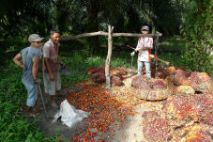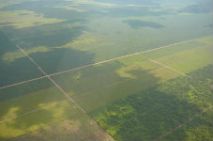















Fussball-Trikots aus den
60er und 70er Jahren. Kult und Style pur!


|
|

schatzsuche.ch
Gratis-Wettbewerb
Flugreise für 2 Personen
& 100 Tagespreise zu gewinnen!
Spielspass pur!

|
|
|
|

  Jaboury Ghazoul ist Professor für Ökosystem-Management an der ETH Zürich.
|
   Family farming of oil palm in Sumatra, Indonesia.
|
   Large-scale palm oil plantation in Borneo.
|
 Abbildungen vergrössern
Abbildungen vergrössern
Shopping - Geschenktipps und weiteres


 Xbox Games Xbox Games
 Mono Uhren Mono Uhren
| 
|
Samstag, 21. Dezember 2013 / 10:30:00

Who will be the future farmers?
2014 will be the International Year of Family Farming, so it is a good time to take stock of what the future holds for small farms across the world, particularly when farmers' children are leaving farms in search of more enticing opportunities in cities.
The Food and Agricultural Organization (FAO) of the United Nations estimates that food production needs to increase by 70 percent within 40 years to meet the needs of an ever growing population. Scientists are working feverishly to develop improved crops and production systems to meet this challenge, while also seeking to minimize impact on the environment. Science has plenty of new tools to play with. Using new technologies farmers are able to match crops to optimal site conditions from scales spanning centimetres to landscapes. Improved crop varieties have better resistance to pests and pathogens, are more efficient in their use of nutrients and water, and convert more of the light's energy to wholesome grain. These new emerging technologies offer plenty of optimism for future farmers.
But we are forgetting something. Who are the future farmers? I recently had the privilege to meet a Colombian coffee farmer whose view of the future challenge to food production was simply put: «There will be no farmers». He explained that his children have no intention to farm coffee, or anything else for that matter. He is proud to have been able to send them to school and university, but reticent that in consequence they now have good jobs in Bogota. What will happen to his farm?
«I'll probably have to sell it to a neighbour,» he tells me. Except, all the neighbouring farmers are in much the same position.
Rural to urban exodus
Indian coffee farmers in Kodagu, in the South West Indian state Karnataka, also speak with pride of the urban professions their children have grown into, but ponder the future viability of their own farms. These people have strong cultural connections to Kodagu and they will not easily part with their farms. Instead, these coffee farms might be increasingly run by managers, who have fewer incentives to invest and innovate. Meanwhile, in Africa, agribusiness, often sponsored by foreign states, is capitalizing on new opportunities to buy up land and consolidate many smallholdings into large and intensively managed farms that apply modern machinery, synthetic fertilisers and pesticides, and improved crop varieties to increase production. Many farmers willingly sell their land as they see few opportunities for their children in agriculture, and the youth are voting with their feet and moving in great numbers to the cities.
I don't know whether this rural to urban exodus is widespread across the globe, but my discussions with Indian, Colombian, and Indonesian farmers, as well as with farmers in Australia, Switzerland, the UK, and the United States, suggests that this is a prevalent trend. A brief look at the literature seems to confirm this view. In Australia, for example, the number of grain farms has fallen by over 40 percent since 1975. In the United States the number of farms has fallen from 6,4 to 2,0 million from 1920 to 1990, while the total area of farmed land has stayed the same. Much the same can be said for Western Europe. Will developing countries follow similar trajectories? If so, it would represent dramatic change in farming systems, with interesting implications for future food production.
Small farms versus large agribusinesses
While I feel very much more inclined to favour a landscape of small-scale farms that supports a diversity of production, a thriving rural community and a richer semi-natural landscape, perhaps the consolidation of smallholdings into larger farms is no bad thing from a global perspective. Large intensively managed farms are more productive: the 40 percent decline in the number of Australian farms has been matched by a 140 percent increase in wheat production over the same period. Less land will therefore be required to provide the same amount of food, which is a good thing for the environment in view of the fact that most destruction of natural land is through agricultural expansion. It also gives some hope that we will be able to meet FAO's ambitious food production target.
Large agribusinesses have other advantages too. They have greater capacity than smallholders to anticipate problems and respond to them. They are more likely to be able to assimilate and adopt new technologies and scientific outputs. Moreover, they have the resources and the economies of scale to implement these new technologies and management systems, and they are not plagued by the same credit financing problems that small farmers have to deal with. As a result, they are less risk averse and more open to innovation than small-scale farmers, for whom a poor decision could spell years of indebted hardship.
Changing rural landscapes
So what of smallholders and small-scale farms? What does the future hold for these farmers? It might be a good future that is not tied to farming. If the children of farmers take the first opportunity to leave farming for something more attractive in the city then that too, perhaps, is no bad thing.
Nonetheless, there are repercussions for our future that we need to acknowledge. Our rural landscapes will become less diverse and more monotone. Large intensively managed farms are less attractive, support less biodiversity and provide fewer ecosystem services. Our cultural and societal connections that we have with a traditionally farmed landscape will weaken. Our predominantly urban populations will be increasingly disconnected from the process of food production as it becomes intensified and industrialized.
We might think that these are choices we have to make, but I suspect that they are choices that are being made for us, willingly or otherwise, by the children of farmers who are increasingly pursuing alternative livelihood opportunities in the city.
Prof. Jaboury Ghazoul (Quelle: ETH-Zukunftsblog)
Artikel per E-Mail versenden
Druckversion anzeigen
Newsfeed abonnieren
In Verbindung stehende Artikel:
Reforestation: a chance for farmers
Mittwoch, 11. Juni 2014 / 12:30:19
Feeding India - An Educational Journey
Freitag, 7. März 2014 / 13:09:00
Erträge schonend steigern - aber wie?
Dienstag, 4. Februar 2014 / 12:41:00
[ weiter ]
Resilience in Food Systems
Freitag, 10. Januar 2014 / 15:42:00
Failed civilizations, food bubbles and satellites
Freitag, 13. Dezember 2013 / 09:52:00
Is chocolate sustainable?
Freitag, 8. November 2013 / 13:51:00
|

| 
|
Publireportage

Mit dem Privatjet durch Europa

Nach Cannes, Nizza, Paris, Amsterdam, Düsseldorf oder London jetten? Von einem zentral in Europa gelegenen Flughafen wie dem von St. Gallen und Altenrhein in der Schweiz ist das überhaupt kein Problem.
[ weiter ]
|

|
|

|
World-class Startups. Swiss Made.
venturelab AG
Kesslerstrasse 9, 9000 St. Gallen |
|
|
Firma genial einfach gründen und Erfolg versprechend starten.
IFJ Institut für Jungunternehmen
Schützengasse 10, 9000 St. Gallen |
|

|
Das unabhängige Elektronische Medienhaus aus St.Gallen.
VADIAN.NET AG
Katharinengasse 10, 9000 St. Gallen |
|

|
Die Schweizer Hotel-Plattform
hotel.ch
Katharinengasse 10, 9000 St. Gallen |
|
|
Expanding Business Horizons
Greater Zurich Area AG
Limmatquai 122, 8001 Zürich |
| | 1 bis 5 (von 4'131 Einträgen)
Mit Ihrem Eintrag präsentieren Sie Ihr Unternehmen in einem sehr attraktiven und dynamischen Umfeld von innovativen Unternehmen. Nutzen Sie jetzt Ihre Chance, attraktive Geschäftspartner für den zukünftigen Erfolg kennen zu lernen. |
|















